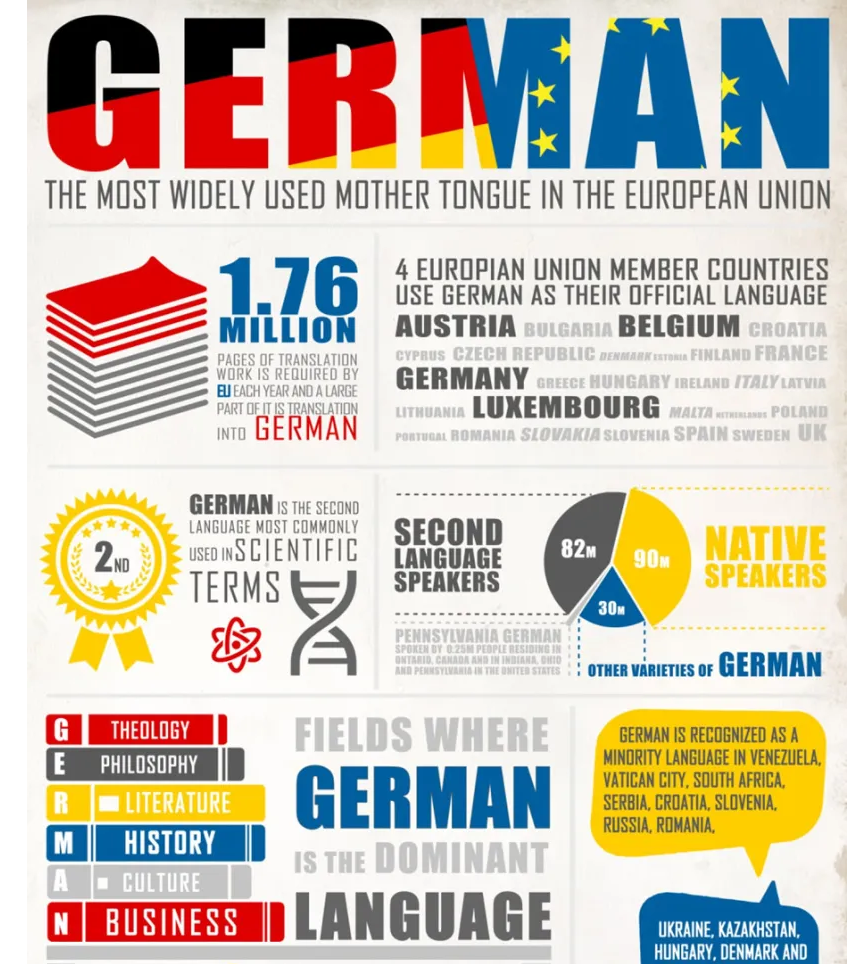
Why German
10 Motivations behind WHY GERMAN IS A particularly Magnificent LANGUAGE Anybody who has courageously attempted to realize this language likely concurs with Imprint Twain who once proclaimed: " Never knew before what time everlasting was made for. It is to allow a few of us an opportunity to learn German." I'm not going to mislead anybody, German is hard to learn (have you at any point asked why it was Einstein's local language?) albeit the degree of trouble might be under conditions, for example, your native language and your regular nearness with it. Indeed, even two hours of German examples each week, for example, could lead you to an unending excursion until you learn it really - I mean have the option to keep a normal discussion! In any case, it is obvious that this is a strong language, since it's the most spoken one in Europe! So why not learn it? Occupations for German speakers in Europe have detonated as of late; if you have any desire to cause business in Germany you to need to communicate in German, if not there will be no business. This post is to provide you with an overall thought of how astounding and amazing the German language is. Reality # 1 The German letters in order has another consonant than English German and English, for example, utilize Roman letter set yet German contains an additional consonant "ß" and it's classified "scharfes s" which in a real sense signifies "sharp s". The grapheme "ß" is articulated very much like an ordinary s. Examples: beißen = to bite; draußen = outside; Gruß = welcoming. Truth #2 English and German offer 60% of their jargon Assuming English is your local language and you have previously been in contact with German, you have tracked down numerous comparable words. To give some examples, words like pompous, steadfast, victorious, gold and craving have similar importance in the two dialects. Truth # 3 German is spoken over each of the six mainlands In Europe, it is the most broadly communicated in language with a populace of very nearly 100 million local speakers and it's an authority language in Austria, Switzerland, Luxembourg, Liechtenstein, and Belgium. It's a perceived minority language in Russia and Kazakhstan as well as in Namibia and the southern tip of Brazil. Significant German-talking minorities are likewise tracked down in Australia, South Africa, Bolivia, Paraguay, and Argentina. Additional tip: Assuming you are hoping to move to Austria with your German language abilities, ensure you look at the Austria visa prerequisites. Truth # 4 First letter of each and every thing starts with capital German purposes capitalized for the main letter of a thing. Researchers as of late needed to abrogate this standard yet they understood that putting capitals really makes perusing a lot quicker and more straightforward. Here is a model: Trauben, Birnen und Bananen sind meine Lieblingsfrüchte. Grapes, pears, and bananas are my natural products. Reality # 5 Words can get unquestionably lengthy German can make compound words, meaning you can make a long word by intertwining at least one together. The outcomes can wind up in a word like RindÂfleischÂetiÂketÂtierungsüberÂwaÂchungsÂaufÂgaÂbenÂüberÂtraÂgungsÂgeÂsetz(Beef Labeling Supervision Task Transfer Act), or Donaudampfschifffahrtselektrizitätenhauptbetriebswerkbauunterbeamtengesellschaft.(Danube steam shipping electricity main depot construction sub-civil servant company.) Reality #6 German has three sexual orientations It's valid, things will have an orientation. In this way, manly, ladylike, and nonpartisan are shown by articles like der, kick the bucket, das. Der Vater = the dad Die Mutter = the mother Das Kind = the kid Exception: das Mädchen = the young lady is impartial, not female! Truth #7 German declensions Though Germanic dialects don't utilize declensions, German does, in any case. In spite of the fact that it's fairly a thing in the Latin dialects, for reasons unknown German has likewise embraced it. Luckily, there are just four cases in German, while Latin has six. Take for instance the word Schatz = treasure. Nominative: der Schatz Genitive: des Schatzes Dative: dem Schatz Accusative: den Schatz Reality #8 It has a great deal of interesting bogus companions with English Albeit German and English are firmly related, there are some beguiling words which significance you would be wise to check two times before you offer something wrong. pass = to pass however Pass = Passport boot = shoe yet Boot = boat gift = present yet Gift = poison Truth #9 Consideration regarding the end is required The word request in German is genuinely unbending. You need to peruse or pay attention to all of the words to get a handle on its significance. Contingent upon the idea of the sentence, a significant word, like an action word(verb), is set at the end. Example: Sie kommt heute nicht, weil sie krank ist. She isn't coming today, since she is debilitated. Reality #10 German can be extremely unobtrusive The magnificence of German is that it empowers the speaker to communicate a thought in its most profound intricacy with only single word. Different dialects could require an entire sentence for a similar significance. The accompanying don't have a word-by-word interpretation in English: sich vergegenwärtigen - to revive a previous thought and apply its worth in the present mitdenken - to think in a collaboration for a typical reason effectively Sprachkrise - the profound powerlessness to communicate one's thoughts through language, frequently alluding to craftsmen German merits learning since it's entirely adaptable, viable, and expressive. Try not to get deterred by its intricacy, you don't have to learn it impeccably yet with enough practice, your language information will reach out to additional skylines.






